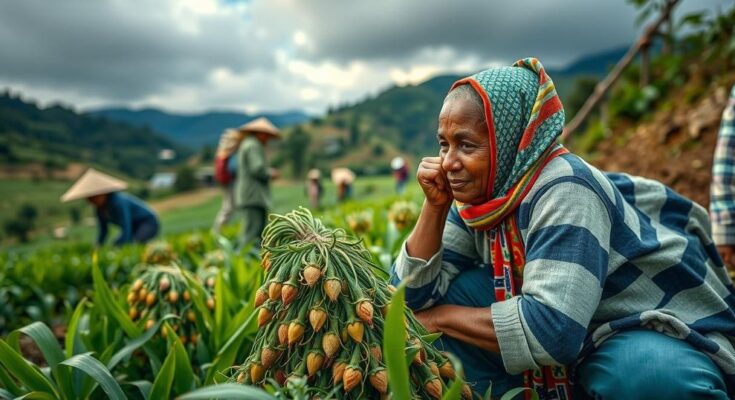Fairtrade producer organizations are increasingly developing climate change adaptation plans to enhance agricultural resilience amidst climate challenges. By the end of 2022, 502 organizations had implemented measures addressing issues like drought, disease, and pest resistance. Most plans showed satisfactory quality, and the common strategies included sustainable farming practices and farmer training. Recommendations for strengthening data collection and considering future climate scenarios were also highlighted.
Recent research conducted by Fairtrade International indicates that a significant number of Fairtrade producer organizations are proactively developing and implementing climate change adaptation plans (CCAPs) to enhance their agricultural production. As outlined in the study titled “Exploratory Study into Climate Change Adaptation Plans and Measures in the Fairtrade System,” the primary initiators of these plans have been coffee producers, although organizations producing cocoa, tea, bananas, and sugar are also participating to address challenges such as rising temperatures, pest infestations, diseases, and droughts. By the end of 2022, a total of 502 producer organizations, accounting for approximately one-quarter of all Fairtrade certified organizations, had established climate change adaptation plans. Remarkably, 96 percent of these organizations had commenced either full or partial implementation of their plans, undertaking several initiatives on their farms. An examination of some of these plans revealed that most were of satisfactory or moderate quality, though 17 plans were criticized for lacking sufficient contextual information and a clear connection between climate threats and the chosen adaptive strategies. To gain further insight into the practical application of these plans by producers, the researchers conducted an online survey among Fairtrade producer organizations in Africa and Latin America that had put these plans into action. They analyzed responses from 37 organizations, nearly 10 percent of the total surveyed, and gathered qualitative data through interviews with managers and consultations with Fairtrade staff. The responses indicated that developing CCAPs not only enhanced farmer knowledge and awareness but also facilitated the early adoption of practices designed to improve production resilience. Commonly implemented measures included the introduction of disease-resistant crop varieties, soil health improvement, effective water use, shade management, and integrated pest management. The study corroborates that these measures are recognized as effective in fostering climate resilience, as substantiated by an accompanying literature review. Key factors promoting successful implementation included farmer training on adaptation techniques, awareness-building regarding climate change, access to technical and financial resources, and the capacity to invest in necessary technology or infrastructure. Post-implementation, the surveyed organizations reported various benefits, including enhanced soil quality, reduced chemical fertilizer usage, increased crop yields, and improved pest resistance. The researchers recommend bolstering data collection and monitoring protocols for more systematic evaluation of the adaptation measures’ impact. For instance, producer organizations are encouraged to establish baseline data collection and improve ongoing data management processes. Additionally, the research emphasizes the necessity for CCAPs to incorporate future climate scenarios. Currently, many adaptation strategies are cultivated at the farm level and seem to address only moderate climate change impacts. However, as climate challenges intensify, sustaining agricultural production may become increasingly difficult or impossible. The adoption of a broader set of measures, which may include collective action among producer organizations to implement substantial changes to their production systems and supporting institutions, will be essential. The researchers conclude that long-term adaptation to climate change mandates ongoing training, expert advice, and accessible financing to enable farmers to invest in transformational technologies and infrastructure adjustments.
Climate change poses a substantial threat to agricultural productivity worldwide, especially for smallholder farmers dependent on Fairtrade exports. Fairtrade International recognizes the importance of equipping these producers with adaptation strategies that bolster resilience against the adverse effects of climate alterations. This initiative focuses on compiling adaptation plans that tailor solutions to specific crops and regions, thereby enhancing sustainable farming practices while supporting fair trade principles.
In conclusion, the proactive development and implementation of climate change adaptation plans by Fairtrade producer organizations exemplify a significant step towards enhancing agricultural resilience in the face of climate change. Through improved practices and effective resource management, farmers are likely to experience a range of benefits, including increased crop yields and improved soil health. However, ongoing efforts to strengthen adaptation measures, future planning, and increased financial support are crucial for sustaining these advancements in the long term.
Original Source: www.fruitnet.com




